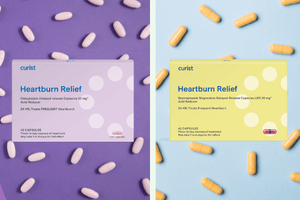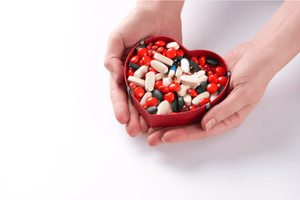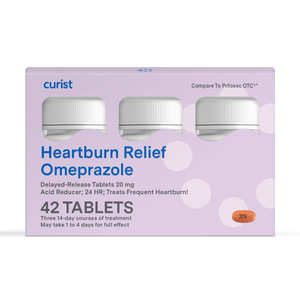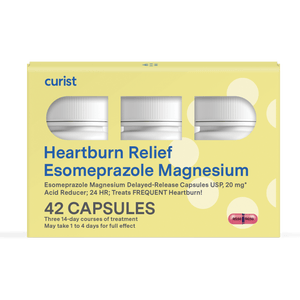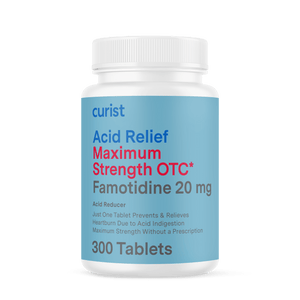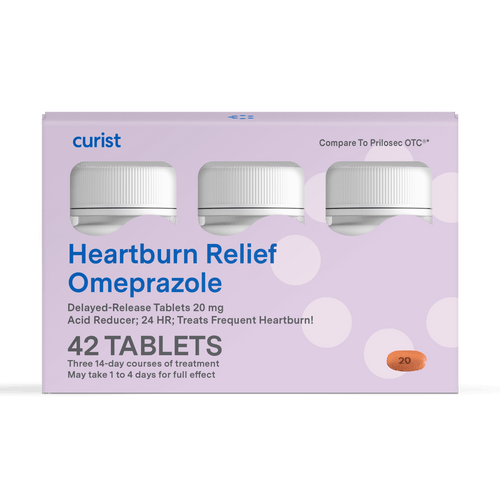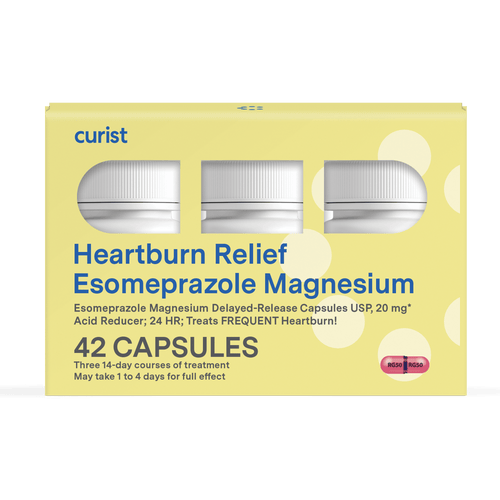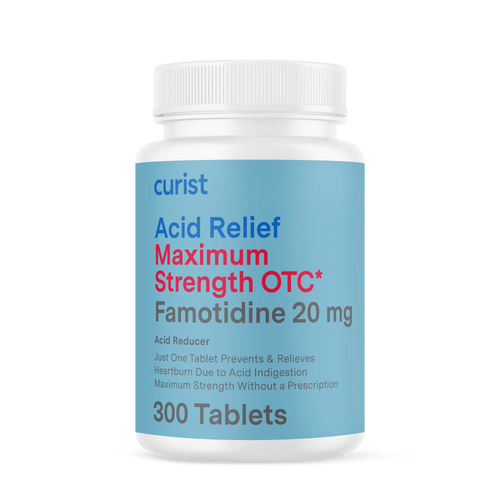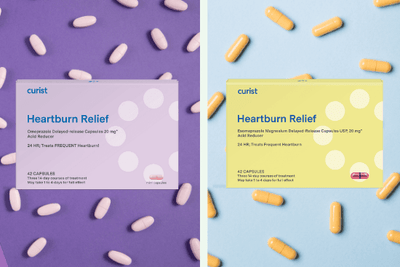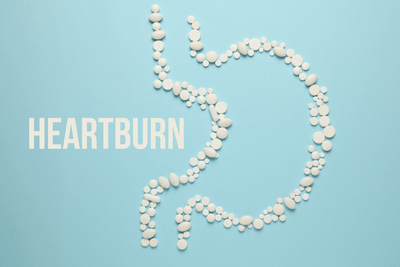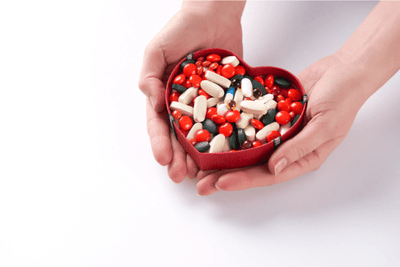Curist delivers over-the-counter medicines to your door at a fraction of the price of traditional brands. We hope everyone stays safe and healthy during this time.
There are many treatment options available for gastroesophageal reflux disease, also known as GERD. These include antacids, H2 blockers, and proton pump inhibitors (PPIs). But what exactly is GERD? How do I know which medication works best for my GERD? Continue reading to learn more about the different treatment options available OTC or by prescription, and discover which medication may work best for you!
What is GERD? How Do I Know If I Have Heartburn or GERD?
Heartburn is an uncomfortable, burning sensation or pain located in your lower chest, just behind your breastbone. Sometimes, this pain can radiate up into your chest, back, throat or next. It can often get worse after eating (within an hour after meals), in the evening, when lying down at night or bending over. Occasionally, you may also experience a sour or bitter taste at the back of your throat.
Heartburn is a symptom of acid reflux and gastroesophageal reflux disease (GERD). Acid reflux is a medical condition in which stomach acid flows backward into your esophagus, the tube that connects your mouth to your stomach. Acid reflux can sometimes progress to GERD which is the chronic form of acid reflux and tends to be more severe. If you experience heartburn symptoms more than twice a week, you may have GERD.
If you would like a better understanding of how heartburn is caused and how you can properly treat it, make sure to check out our common heartburn myths vs facts article!
How Do I Get Fast, Immediate Heartburn Relief for GERD?
Over-the-counter (OTC) medications are often the first line of treatment against heartburn. In most cases, heartburn symptoms can be treated with antacids, H2 blockers (also known as acid blockers), and proton pump inhibitors (PPIs).
Do Antacids Treat GERD Heartburn Fast with Immediate Relief?
Antacids treat heartburn very quickly with immediate relief. Common antacids include brands such as Tums®, Rolaids®, Maalox®, and Gaviscon®, which can be purchased over-the-counter and do not require a doctor’s prescription. These medications typically contain ingredients such as magnesium carbonate or calcium carbonate. Antacids work very fast to treat heartburn, typically in seconds, to neutralize stomach acid, making your stomach contents less acidic and reducing the possibility that acidic liquid will leak back into your esophagus.
Do H2 Blockers Treat GERD Heartburn Fast with Immediate Relief?
Similarly, H2 blockers such as Pepcid® (famotidine) and Tagamet® (cimetidine) can be purchased over-the-counter and do not require a doctor’s prescription. H2 blockers start working in minutes and typically you will experience heartburn relief within 15 to 30 minutes after taking a H2 blocker to treat heartburn. H2 blockers mainly work by preventing cells in your stomach from producing high levels of stomach acid.
Do PPIs Treat Heartburn Fast with Immediate Relief?
Proton pump inhibitors (PPIs) such as omeprazole (brands Curist Heartburn Relief product or Prilosec) or esomeprazole (brands Curist Heartburn Relief or Nexium) can be purchased over-the-counter and do not require a doctor’s prescription as well. However, unlike antacids or H2 blockers, PPIs are not intended for immediate heartburn relief. They work by halting almost all production of your stomach acid, and can take up to 1 - 4 days for full effect.
If you would like to learn more about the similarities and differences between antacids, H2 blockers, and PPIs, make sure to check out our comparison article on Nexium vs Prilosec vs Pepcid vs Tums.
What is the Most Effective and Strongest Medication for GERD?
Proton pump inhibitors (PPIs), such as omeprazole and esomeprazole, are the most effective and strongest class of medications for treating GERD. They work by decreasing the amount of acid that the stomach produces and are more effective in providing long-lasting heartburn relief than H2 blockers or antacids.
Omeprazole and esomeprazole are available as both over-the-counter and prescription. If you are experiencing frequent heartburn symptoms that occur 2 or more days per week, you may have GERD. When purchased OTC, keep in mind that these PPIs are typically of a lower dose (20 mg strength) and meant to be only taken for a short period of time (14 days or 2 weeks) to treat heartburn. If symptoms of your acid reflux do not resolve after 14 days of use, reach out to your doctor for a prescription as you may need higher doses to treat GERD.
At Curist, we sell OTC PPIs like omeprazole and esomeprazole online at a fraction of the brand price and without needing a doctor’s visit.
If you are unsure whether omeprazole or esomeprazole is better for your treatment of GERD, check out this comparison article on the similarities and differences between omeprazole vs esomeprazole to help you decide!
Which Heartburn Medicine Works Best for GERD?
Antacids (e.g. Tums, Maalox), H2 blockers (e.g. Pepcid, Tagamet) and PPIs (Prilosec, Nexium) are the three classes of medications that can help treat GERD symptoms.
Of the three classes, antacids are the fastest acting. They typically start providing heartburn relief within five minutes; and as such, should only be used on an as-needed (on-demand) basis for breakthrough symptoms that occur ideally less than once per week. Keep in mind that antacids do not prevent GERD.
Both H2 blockers and PPIs can help treat symptoms of GERD, but the difference lies in their onset of action. H2 blockers typically start working within an hour and last for about 9 to 12 hours; while PPIs can take up to 4 days for full effect.
When compared to H2 blockers, research has shown that PPIs such as omeprazole (brands Curist Heartburn Relief or Prilosec) and esomeprazole (brands Curist Heartburn Relief or Nexium) are most beneficial in treating frequent episodes of heartburn.
These medications can both be purchased over-the-counter in the form of 20 mg strength delayed-release tablets or capsules. To get the most benefits from these PPIs, it is best to take them once daily for 14 days. If you feel the need to use them for more than 14 days, make sure to consult with your doctor first.
What is the Best Daily Medication for GERD?
Proton pump inhibitors (PPIs) are among the best daily medications for the treatment of GERD. Common PPIs include omeprazole and esomeprazole. Unlike antacids and H2 blockers which provide quick but short lasting heartburn relief, PPIs last longer and provide chronic heartburn relief often making them appropriate to treat GERD. When used to treat GERD, PPIs are required to be used as a prescription under the care of a medical professional.
PPIs like omeprazole and esomeprazole are also available over the counter, without a prescription, for the treatment of frequent heartburn. When purchased over the counter, these medications should only be taken once daily for 14 days. If you feel the need to use them for more than 14 days, make sure to consult with your doctor first since long-term use can put you at risk for other health issues such as osteoporosis, low magnesium or vitamin B12 levels, and rebound acid secretion (where your body starts to create more acid than before after stopping these medications).
Since omeprazole and esomeprazole can both take some time (ranging from several days to weeks) to reach full effects, they can be taken in combination with a quick-acting antacid for quick heartburn relief.
How Can I Prevent Heartburn or GERD?
Occasional heartburn is common but no cause for concern. Most people can manage the discomfort of heartburn on their own through lifestyle changes and over-the-counter medications. The key is to identify what triggers your heartburn and what lifestyle or diet adjustments you can make to help reduce and avoid them. Here are some must-know tips to help you and your loved ones ease heartburn. Making changes to your diet and trying home remedies can go a long way in heartburn prevention.
If you’re pregnant and wonder if omeprazole or esomeprazole are safe for you, check out our article on what you need to know about PPIs during pregnancy and breastfeeding.

